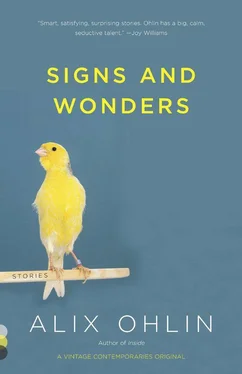Alix Ohlin - Signs and Wonders
Здесь есть возможность читать онлайн «Alix Ohlin - Signs and Wonders» весь текст электронной книги совершенно бесплатно (целиком полную версию без сокращений). В некоторых случаях можно слушать аудио, скачать через торрент в формате fb2 и присутствует краткое содержание. Год выпуска: 2012, ISBN: 2012, Издательство: Random House, Inc., Жанр: Современная проза, на английском языке. Описание произведения, (предисловие) а так же отзывы посетителей доступны на портале библиотеки ЛибКат.
- Название:Signs and Wonders
- Автор:
- Издательство:Random House, Inc.
- Жанр:
- Год:2012
- ISBN:9780307948649
- Рейтинг книги:3 / 5. Голосов: 1
-
Избранное:Добавить в избранное
- Отзывы:
-
Ваша оценка:
- 60
- 1
- 2
- 3
- 4
- 5
Signs and Wonders: краткое содержание, описание и аннотация
Предлагаем к чтению аннотацию, описание, краткое содержание или предисловие (зависит от того, что написал сам автор книги «Signs and Wonders»). Если вы не нашли необходимую информацию о книге — напишите в комментариях, мы постараемся отыскать её.
Signs and Wonders — читать онлайн бесплатно полную книгу (весь текст) целиком
Ниже представлен текст книги, разбитый по страницам. Система сохранения места последней прочитанной страницы, позволяет с удобством читать онлайн бесплатно книгу «Signs and Wonders», без необходимости каждый раз заново искать на чём Вы остановились. Поставьте закладку, и сможете в любой момент перейти на страницу, на которой закончили чтение.
Интервал:
Закладка:
“Not you, though,” he said, with that soft Southern lilt. “I bet you can go anywhere and do anything. You’re made of stronger material.”
“I don’t feel particularly strong,” I said.
“Do you feel particularly weak?”
“I guess not.”
“That’s what I mean,” he said. “You’re the most normal person I know.”
I did not take this as a compliment.
But he smiled when he saw my frown, and his hair fell over his eyes. “Don’t worry about it,” he said gently. “I’m sure it’ll come in handy eventually.”
Wherever he came from, Martin started hanging out with us, and pretty soon it was clear he was there for Millie. When she was in the room he still paid attention to you, but you could tell it was an effort. I couldn’t blame him, really; Millie was the kind of person I’d come to New York to be around. Short, with dark spiky hair, she was good at poker and occasionally smoked cigars. Her skin glowed even at three in the morning after a night of drinking. She was an assistant at a gallery on Fifty-seventh Street. If, on a Saturday afternoon, we dipped into a gallery, Millie would take two seconds before pronouncing the work “shit” or “genius”—there was no in-between, in her opinion — while I tried to figure out why she’d landed to one side of the pendulum rather than the other. I myself had no idea, but I liked the confidence of these declarations.
I think Martin liked it too. She had no fear; he was afraid of everything, including rejection, so he watched her from a distance as she felt him watching, and they were locked together in this as if by contract. She must have enjoyed knowing he was always there, a gentleman beanpole on the sidelines, following her every move with those watery blue eyes. There isn’t a woman on this earth who doesn’t want to be adored.
At work, Sarah and I were also adored, albeit in a different way. Our boss, Eric, was an elderly bohemian who wore pilled woolen cardigans and too-short pants, and spent afternoons in his office reading manuscripts while twirling his beard between his thumb and index finger, making a little curl that stood out from his chin. By five o’clock his beard would be a tufted mess of curls, all fluffed out like the feathers of some preening bird. Because of this, Sarah and I called him the titmouse.
“Titmouse on the move,” one of us would mutter to the other as he came toward our desks, and we’d straighten up to look like we were actually working. There wasn’t really any need to talk in code — there was no one else around, and Eric’s hearing wasn’t great — but this was the sort of thing we found hilarious at the time. Taking flight meant he was leaving the office on some errands. Worms: he was going for lunch. Flapping wings: he was in the photocopier room, looking perplexedly at the machine. Eric seemed to think it was demeaning for him to ask a woman to help with basic office tasks, even though this was our job, a scruple we didn’t hesitate to exploit. We let him suffer for as long as we could stand over some paper jam or mailing snafu before we’d come to his aid. The photocopier, the fax machine, the FedEx label — these were newfangled technologies so complicated that in the face of them Eric simply threw up his hands. He’d grown up in a New York where any business deal was done via handshake at a cocktail party below Fourteenth Street. Sarah and I loved him. When the titmouse came back with worms, we’d drop by his office on some pretense and while he was eating we’d get him to tell us stories about parties at George Plimpton’s apartment, Mary McCarthy throwing a drink in somebody’s face, arguments that spilled out into the streets at two a.m. Eventually it would be midafternoon and he’d glance at the pile of manuscripts at his desk and sigh. “Well, my lovelies, this magazine isn’t going to publish itself.”
How exactly the magazine did manage to publish itself was a mystery. My job, nominally, was as assistant to the head of sales, Judith, who worked out of her home and besieged me with harried, confusing phone calls. I’d only met her once. She must have been good at her job, though, because she was always finding some fancy restaurant or upscale furniture store to place an ad with us. My main task was to coordinate her expense reports. I used to show Sarah the tallies for lunch or drinks. “Can you believe this?” I’d say. She spent more on cocktails than I made in a month.
Sarah just shrugged. She was Eric’s assistant. In high school she’d been an indifferent student, and I didn’t even remember her reading many books, but in New York she’d discovered a seriousness of purpose. Her job was to screen the flood of incoming manuscripts. Every time the mail was delivered, it included dozens of slush submissions in manila envelopes, and Sarah visibly shuddered. Her bag was always crammed with paper, her eyes red and shadowed, and she said she dreamed about all the poems and stories and essays floating around in the world waiting to be read. Because I didn’t have enough to do, I’d sometimes offer to help her out, but she’d shake her head. Being burdened made her feel important.
In the evenings, we’d meet up with Martin and Millie and some other combination of people — some friend from out of town, or a girlfriend or boyfriend of the moment — and head to Veselka for dinner, or to Brownies to hear some music, or, in the long, humid summer, to the park or somebody’s roof. I remember one night in July at the apartment of somebody none of us knew very well. We’d invited ourselves over because he’d mentioned central air-conditioning. It was actually his uncle and aunt’s place; they were gone for the summer on some lavish vacation, and he was apartment sitting for them in between semesters of graduate school at NYU. Skinny and bearded, he stank of smoke and talked about Harold Bloom in scathing, urgent terms, and we were willing to put up with all of this in exchange for an evening in that cold, expensive apartment. He served us chilled white wine in fancy glasses, and we took off our shoes and ran our toes over the luxurious carpets as if they were a sandy beach. At least most of us did. Millie just sat on the couch, with her legs tucked daintily beneath her.
The grad student, whose name is lost to me, was also supposed to be taking care of the two elderly cats, sickly and long-haired, who trailed around the couch sneezing. He had to feed them special medicine twice a day, inside of hollowed-out liver treats. Despite all this special care they looked mangy, like they lived in some alley and foraged in trash cans for food.
“Those are the saddest cats I’ve ever seen,” I said.
“They live better than you do, I bet,” the guy said.
I flushed, not sure if he was insulting me or commenting on his aunt and uncle. “They do have air-conditioning,” I said.
Martin got down on the floor and reached out to pet them, making clicking noises with his tongue. With his long legs and other arm folded up, he looked like a cricket. The cats ignored him.
“Here, kitties,” he said, fixated on them, his pale face sheened with sweat. Millie was sitting behind him, and she put her feet down on the floor as she leaned over to sip from her glass of wine. This put the smooth, glowing skin of her calves right next to his face, and I saw how it pained him to be so close. Millie didn’t notice. She was arguing with the grad student about Barbara Kruger’s art, which she thought was profound and he said was overrated. It was the kind of argument I’d come to New York to witness, perhaps even participate in, but I was distracted by the little drama on the floor and the contrast between Martin’s pale, pockmarked chin and Millie’s lovely legs.
“Martin,” I said softly. “Martin.” I shook my head at him, and he stared back blankly.
Читать дальшеИнтервал:
Закладка:
Похожие книги на «Signs and Wonders»
Представляем Вашему вниманию похожие книги на «Signs and Wonders» списком для выбора. Мы отобрали схожую по названию и смыслу литературу в надежде предоставить читателям больше вариантов отыскать новые, интересные, ещё непрочитанные произведения.
Обсуждение, отзывы о книге «Signs and Wonders» и просто собственные мнения читателей. Оставьте ваши комментарии, напишите, что Вы думаете о произведении, его смысле или главных героях. Укажите что конкретно понравилось, а что нет, и почему Вы так считаете.












